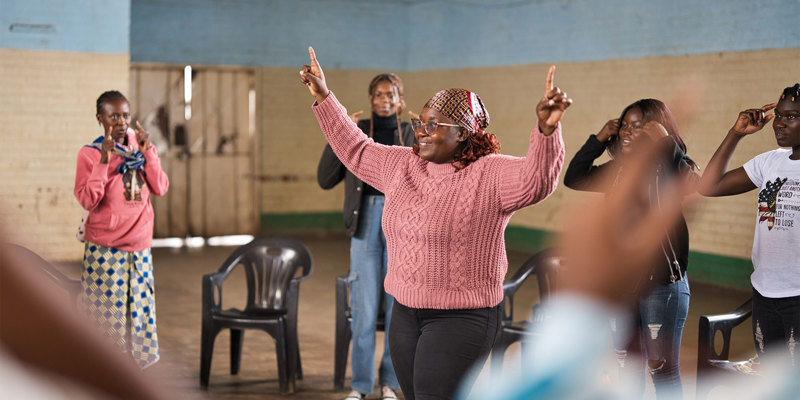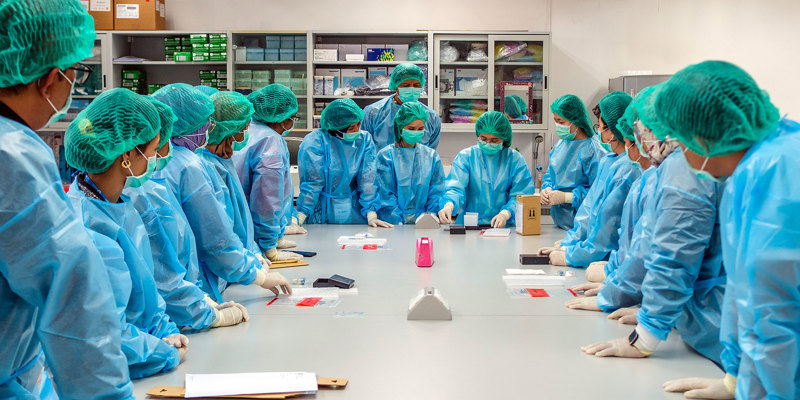Global Fund Agreements Substantially Reduce the Price of First-line HIV Treatment to Below US$45 a Year
30 August 2023
GENEVA – Through its competitive tenders, the Global Fund to Fight AIDS, Tuberculosis and Malaria (the Global Fund), together with its partners and generic pharmaceutical manufacturers, will be able to offer tenofovir disoproxil fumarate, lamivudine and dolutegravir (TLD), a first-line HIV treatment for under US$45 per person, per year for the first time. This improved pricing – a 25% reduction – will allow governments in resource-limited settings to expand access to critical HIV services.
Antiretroviral treatment is a lifesaving HIV treatment that is vital to keep people living with HIV healthy. TLD is an antiretroviral treatment in one pill that combines three medicines: tenofovir disoproxil fumarate, lamivudine and dolutegravir. It is often called TLD for the medicines it contains. The World Health Organization (WHO) has recommended TLD as the preferred first-line HIV treatment option since 2018 for adults and adolescents. The medicine is preferred because it rapidly suppresses the virus, has fewer side effects, and is easy to take.
“The countries most affected by HIV face enormous fiscal constraints, and there are still millions of people who are HIV-positive who don’t have access to quality treatment,” said Peter Sands, Executive Director of the Global Fund. “Reduced pricing for TLD means governments and other implementers of Global Fund grants can expand treatment programs and invest more in prevention, saving more lives and reducing new infections.”
Today’s announcement builds on progress achieved in 2017, when Indian generic manufacturers, through licensing agreements and with support from UNAIDS, Unitaid, PEPFAR, the Bill & Melinda Gates Foundation, the Global Fund and other partners, made TLD available for low- and middle-income countries at a ceiling price of around US$75 per person, per year. At the time, this unprecedented pricing was a breakthrough toward ensuring the worldwide availability of high-quality treatment for HIV. Since then, through global partnerships and country-led efforts, about 19 million people living with HIV in resource-constrained settings are now receiving TLD, according to the Clinton Health Access Initiative.
This scale has been essential in driving production efficiencies and achieving the lower sustainable pricing secured today, strengthening country-led efforts to reach all people living with HIV who need TLD.
“The expansion of TLD use would not have been possible without the dedicated effort of partners and the strength of generic manufacturers and their ability to rapidly scale the production of high-quality medicines said Hui Yang, Head of Supply Operations at the Global Fund. “The fast introduction of TLD at scale is a compelling example of how collaboration and partnership can achieve sustainable outcomes and help drive equitable access to quality-assured health products.”
In addition to facilitating access to health products internationally, the Global Fund supports the production of health products closer to the people and communities it serves, in complement with partner organizations, including Unitaid, PEPFAR, WHO, and others who also support the development of local and regional manufacturing.
As part of its NextGen market-shaping approach, the Global Fund will continue to work with manufacturers to secure a sustainable supply of affordable HIV treatment. Many of the Global Fund's major pharmaceutical suppliers are based in India and are also critical partners in efforts to scale up regional manufacturing sustainably, particularly in Africa.
To maximize the outcome of this progress, the Global Fund, together with PEPFAR and the National Department of Health, Republic of South Africa, will host the annual ARV Buyer Seller Summit in Maputo, Mozambique, starting on 30 October. The event is a large forum to facilitate exchanges between partners across the antiretroviral supply ecosystem.
Editor’s Note: The Global Fund uses its Pooled Procurement Mechanism to aggregate order volumes on behalf of participating grant implementers to negotiate prices and delivery conditions with manufacturers. In 2021, the Pooled Procurement Mechanism managed approximately US$1.5 billion in orders, serving grant implementers in 90 countries. Health products available through the mechanism include HIV treatments known as antiretroviral medicines, antimalarial medicines, essential medicines for health care, insecticide-treated mosquito nets for preventing malaria, and tests for diagnosing and monitoring disease progression.







